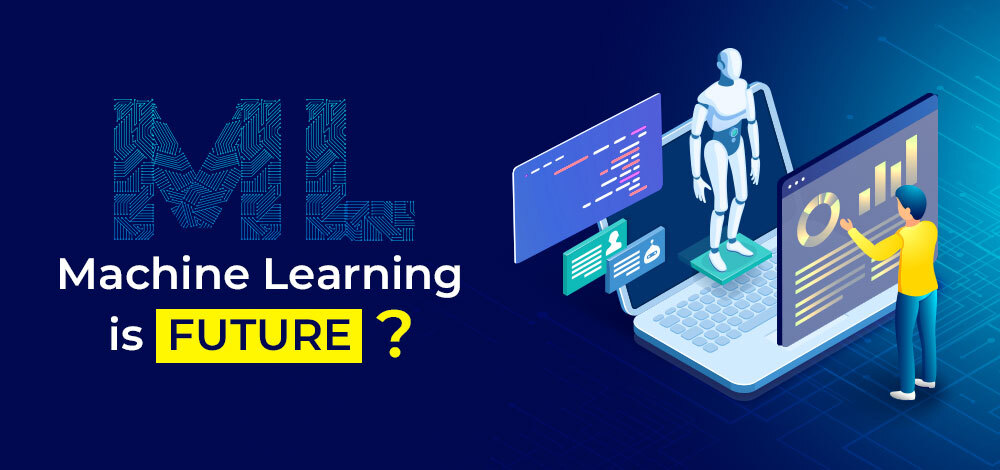In the past decade, machine learning has been rapidly developing and transforming every industry it touches. From healthcare to finance, advertising to transportation, machine learning has revolutionized the way we live and work. But what exactly is machine learning, and why is it considered the future of technology?
Put simply, machine learning is a type of artificial intelligence that uses algorithms and statistical models to analyze and learn from data. Unlike traditional programming, where rules are explicitly defined by a human programmer, machine learning allows computers to identify patterns and insights on their own. This means that machines can continue to improve and adapt their performance over time, without the need for constant manual input. As more and more data is generated every day, it’s no wonder that machine learning is being hailed as the next big thing in technology. In this article, we explore the reasons why machine learning is the future, and what it means for our world.
Machine learning is the future because it is a fast and efficient way to process large amounts of data. It can understand patterns and relationships that are too complex for humans to detect, and then make predictions based on those patterns. This can save a lot of time and money, as well as being more accurate than manual methods. Machine learning is being used in many areas, such as healthcare, finance, and retail, and its use is only increasing. With the right data and algorithms, machine learning can revolutionize any industry.

Why Machine Learning is the Future?
Machine Learning (ML) is a powerful tool that is transforming the way businesses and consumers interact with data. It is a field of artificial intelligence (AI) that focuses on algorithms that can learn from data and improve their performance over time. ML is increasingly being used to automate processes, predict outcomes, and optimize user experiences. ML’s growing ubiquity and importance make it essential for modern businesses to understand and embrace its potential.
What is Machine Learning?
Machine Learning is a form of Artificial Intelligence (AI) that uses algorithms and statistical models to identify patterns in data and make predictions and decisions. ML systems use data to learn from past experiences and adjust their behavior accordingly. They can be trained on data sets to identify patterns, detect anomalies, and make decisions. ML algorithms can be used to help businesses optimize operations, predict customer behaviors, and drive better decision-making.
ML algorithms are used in a variety of applications, including recommendation systems, fraud detection, natural language processing, robotics, and autonomous driving. Machine Learning is becoming increasingly important as businesses strive to make sense of the huge amounts of data generated every day. As businesses become more data-driven, ML will become even more critical for making better decisions and optimizing operations.
Benefits of Machine Learning
ML can offer a range of benefits to businesses. For example, ML can help businesses to automate and optimize processes, identify patterns in data, and improve customer experiences. ML has the potential to help businesses reduce costs and increase efficiency. It can also help to improve customer service and create personalized experiences for customers.
ML can also help businesses gain insights into customer behavior and preferences. By analyzing customer data, businesses can gain a better understanding of customer needs and develop strategies to meet those needs more effectively. ML can also be used to predict customer behaviors and anticipate customer needs, allowing businesses to be more proactive in their customer service.
Challenges of Machine Learning
Despite the many benefits of Machine Learning, there are also some challenges associated with its implementation. One of the biggest challenges is finding the right data sets to train ML algorithms. Data sets must be large enough to be useful, and they must be of high quality and accurately represent the real world. Finding the right data sets can be difficult and time-consuming.
Another challenge is dealing with the complexity of ML algorithms. ML algorithms can be difficult to understand and require specialized skills to implement properly. Additionally, ML algorithms can be expensive to develop and maintain, and can be difficult to deploy in production environments. Finally, ML algorithms can be vulnerable to data bias, which can lead to inaccurate results.
Conclusion
Machine Learning is a powerful tool that is transforming the way businesses and consumers interact with data. It has the potential to automate and optimize processes, predict customer behaviors, and create personalized experiences. However, it also comes with some challenges, such as data sets that must be of high quality and accurately represent the real world, and dealing with the complexity of ML algorithms. Despite these challenges, Machine Learning is becoming increasingly important and businesses must understand and embrace its potential.
Frequently Asked Questions
Machine learning is a field of artificial intelligence that uses algorithms to learn from data, evaluate outcomes, and adapt to new data sets. It is the future of many industries, as it allows organizations to make data-driven decisions that improve efficiency and accuracy.
What is machine learning?
Machine learning is a subset of artificial intelligence (AI) that enables computers to learn from data without being explicitly programmed. It is based on algorithms that iteratively learn from data and adapt to new data sets. In machine learning, computers are trained to find patterns and trends in data, to identify correlations and make predictions. This data can then be used to make decisions or take actions.
How does machine learning work?
Machine learning works by using algorithms to identify patterns and trends in data. The algorithms are built by analyzing a large set of training data and are then used to detect patterns and correlations in new data sets. The algorithms can then be used to make predictions or take actions based on the data. For example, a machine learning algorithm might be used to recommend products to customers based on their past purchases.
What are the benefits of machine learning?
The primary benefit of machine learning is that it allows organizations to make data-driven decisions. By leveraging data and applying machine learning algorithms, organizations can gain insights into customer behavior, optimize their processes, and make more accurate decisions. Machine learning also allows organizations to automate tasks and reduce costs.
What industries are using machine learning?
Machine learning is being used in a wide range of industries, from finance to healthcare to retail. In finance, machine learning is being used to identify patterns in stock prices and to make predictions about future market movements. In healthcare, machine learning is being used to diagnose diseases and to recommend treatments. In retail, machine learning is being used to personalize product recommendations and to optimize customer experiences.
What is the future of machine learning?
The future of machine learning is bright. As technology advances, organizations will increasingly rely on machine learning to make data-driven decisions and optimize their operations. Machine learning will continue to evolve and be used in new and innovative ways, including to automate processes and to develop new products and services. Machine learning is already revolutionizing many industries, and its impact will only continue to grow in the future.

In conclusion, machine learning is rapidly shaping the future of various industries, and it’s here to stay. The growth of data and the need for automation has made machine learning a crucial element in the development of innovative technologies. With the ability to learn and adapt to new data, machine learning can help organizations make better decisions, improve productivity, and drive overall growth.
Moreover, as the technology continues to advance, the potential for machine learning to revolutionize industries like healthcare, finance, and transportation is limitless. With the ability to predict outcomes, detect anomalies, and optimize operations, machine learning is expected to increase efficiency and reduce costs. As such, organizations that embrace machine learning will be better positioned to stay ahead of the competition and drive innovation. In summary, the future is bright for machine learning, and it’s exciting to witness the impact it will have on the world.



